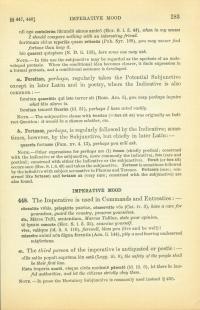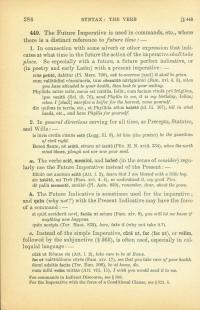Imperative
448. The imperative is used in commands and entreaties.
Cōnsulite vōbīs, prōspicite patriae, cōnservātevōs. (Cat. 4.3)
Have a care for yourselves, guard the country, preserve yourselves.
Dīc, Mārce Tullī, sententiam.
Marcus Tullius, state your opinion.
Tē ipsum concute. (Hor. S. 1.3.35)
Examine yourself.
Vīve, valēque. (id. 2.5.110)
Farewell, bless you!
(Live and be well!)
Miserēre animī nōn dīgna ferentis. (Aen. 2.144)
Pity a soul bearing undeserved misfortune.
a. The 3rd person of the imperative is antiquated or poetic.
Ollīs salūs populī suprēma lēx estō. (Legg. 3.8)
The safety of the people shall be their first law.
Iūsta imperia suntō, eīsque cīvēs modestē pārentō. (id. 3.6)
Let there be lawful authorities, and let the citizens strictly obey them.
Note— In prose the Hortatory Subjunctive is commonly used instead (§ 439).
449. The future imperative is used in commands, etc., where there is a distinct reference to future time.
-
In connection with some adverb or other expression that indicates at what time in the future the action of the imperative shall take place. So especially with a future, a future perfect indicative, or (in poetry and early Latin) with a present imperative.
Crās petitō, dabitur. (Pl. Merc. 769)
Ask tomorrow [and] it shall be given.Cum valētūdinī cōnsulueris, tum cōnsulitō nāvigātiōnī. (Fam. 16.4.3)
When you have attended to your health, then look to your sailing.Phyllida mitte mihī, meus est nātālis, Iollā; cum faciam vitulā prō frūgibus, ipse venītō. (Ecl. 3.76)
Send Phyllis to me, it is my birthday, Iollas; when I [shall] sacrifice a heifer for the harvest, come yourself.Dīc quibus in terrīs, etc., et Phyllida sōlus habētō. (id. 3.107)
Tell in what lands, etc., and have Phyllis for yourself. -
In general directionsserving for all time, as precepts, statutes, and wills.
Is iūris cīvīlis cūstōs estō. (Legg. 3.8)
Let him (the prætor) be the guardian of civil right.Boreā flante, nē arātō, sēmen nē iacitō (Plin. H. N. 18.334)
When the north wind blows, plough not nor sow your seed.
a. The verbs sciō, meminī, and habeō (in the sense of consider) regularly use the future imperative instead of the present.
Fīliolō mē auctum scītō. (Att. 1.2)
Learn that I am blessed with a little boy.
Sīc habētō, mī Tirō (Fam. 16.4.4)
So understand it, my good Tiro.
Dē pallā mementō, amābō. (Pl. Asin. 939)
Remember, dear, about the gown.
b. The future indicative is sometimes used for the imperative; and quīn (why not?) with the present indicative may have the force of a command.
Sī quid acciderit novī, faciēsut sciam (Fam. 14.8)
You will let me know if anything new happens.
Quīn accipis. (Ter. Haut. 832)
Here, take it.
(why not take it?)
c. Instead of the simple imperative, cūrā ut, fac (fac ut), or velim, followed by the subjunctive (§ 565), is often used, especially in colloquial language.
Cūrā ut Rōmae sīs. (Att. 1.2)
Take care to be at Rome.
Fac ut valētūdinem cūrēs. (Fam. 14.17)
See that you take care of your health.
Domī adsītis facite. (Ter. Eun. 506)
Be at home, do.
Eum mihi velimmittās. (Att. 8.11)
I wish you would send it to me.
For Commands in Indirect Discourse, see § 588. For the Imperative with the Force of a Conditional Clause, see § 521.b.
Prohibition (Negative Command)
450. Prohibition is regularly expressed in classic prose (1) by nōlī with the infinitive, (2) by cavē with the present subjunctive, or (3) by nē with the perfect subjunctive.1
(1) Nōlī putāre. (Lig. 33)
Do not suppose.
(be unwilling to suppose)
Nōlī impudēns esse (Fam. 12.30.1)
Don't be shameless.
Nōlīte cōgere sociōs (Verr. 2.1.82)
Do not compel the allies.
(2) Cavē putēs. (Att. 7.20)
Don't suppose.
(take care lest you suppose)
Cavē īgnōscās. (Lig. 14)
Do not pardon.
Cavē festīnēs. (Fam. 16.12.6)
Do not be in haste.
(3) Nē necesse habueris. (Att. 16.2.5)
Do not regard it as necessary.
Nē sīs admīrātus. (Fam. 7.18.3)
Do not be surprised.
Hōc facitō; hōc nē fēceris (Div. 2.127)
Thou shalt do this, thou shalt not do that.
Nē Apellae quidem dīxeris. (Fam. 7.25.2)
Do not tell Apella even.
Nē vōs quidem mortem timueritis (Tusc. 1.98)
Nor must you fear death.
All three of these constructions are well established in classic prose. The first, which is the most ceremonious, occurs oftenest; the third, though not discourteous, is usually less formal and more peremptory than the others.
Note 1— Instead of nōlī the poets sometimes use other imperatives of similar meaning (cf. § 457.a).
Parce piās scelerāre manūs. (Aen. 3.42)
Forbear to defile your pious hands.
Cētera mitte loquī (Hor. Epod. 13.7)
Forbear to say the rest.
Fuge quaerere (Hor. Od. 1.9.13)
Do not inquire.
Note 2— Cavē nē is sometimes used in prohibitions; also vidē nē and (colloquially) fac nē.
Fac nēquid aliud cūrēs. (Fam. 16.11)
See that you attend to nothing else.
Note 3— The present subjunctive with nē and the perfect with cavē are found in old writers; nē with the present is common in poetry at all periods.
Nē exspectētis. (Pl. Ps. 1234)
Do not wait.
Nē metuās. (Mart. Ep. 1.70.13)
Do not fear.
Cave quicquam responderis (Pl. Am. 608)
Do not make any reply.
Note 4— Other negatives sometimes take the place of nē.
Nihil īgnōveris.(Mur. 65)
Grant no pardon.
(pardon nothing)
Nec mihi illud dīxeris. (Fin. 1.25)
And do not say this to me.
Note 5— The regular connective, and do not, is nēve.
a. The present imperative with nē is used in prohibitions by early writers and the poets.
Nē timē. (Pl. Curc. 520)
Don't be afraid.
Nimium nē crēdecolōrī. (Ecl. 2.17)
Do not trust too much to complexion.
equō nē crēdite (Aen. 2.48)
Do not trust the horse.
b. The future imperative with nē is used in prohibitions in laws and formal precepts (see § 449.2, above).



